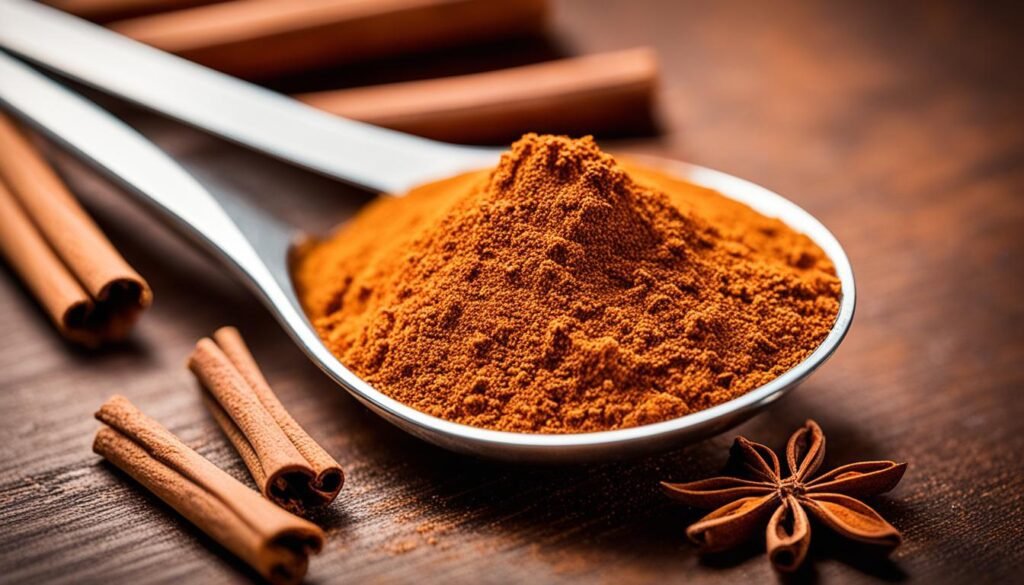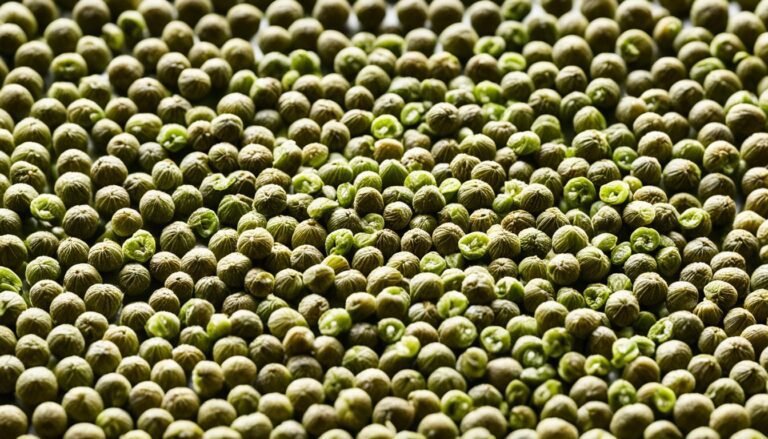Ceylon Cinnamon Health Benefits: Nature’s Sweet Secret

Did you know over 400 million people worldwide deal with diabetes? This fact shows we need natural ways to fight this health issue. Ceylon cinnamon is a key player in this fight. It’s not just tasty but also boosts your health in big ways, making it a secret from nature.
Ceylon cinnamon comes from the Cinnamomum verum tree in Sri Lanka. It’s known for its great taste and more health benefits than other types. It has a compound called cinnamaldehyde. This compound helps make insulin work better and helps control blood sugar, especially for those with Type 2 diabetes.
Looking into how Ceylon cinnamon helps with blood sugar shows it’s full of flavor and life. Studies in top journals like Diabetes Care and the Journal of Medicinal Food show it’s a great addition to managing diabetes.
Key Takeaways
- Ceylon cinnamon’s cinnamaldehyde content can enhance insulin sensitivity and promote glucose uptake, benefiting individuals with Type 2 diabetes.
- Research has shown significant improvements in insulin sensitivity and glycemic control with the use of Ceylon cinnamon.
- Ceylon cinnamon’s antioxidant properties help combat oxidative stress, supporting overall metabolic health.
- The spice’s lower coumarin levels compared to Cassia cinnamon make it a safer choice for regular consumption.
- Ceylon cinnamon’s versatility allows it to be easily incorporated into a variety of heart-healthy and diabetes-friendly recipes.
The Magic of Ceylon Cinnamon
Cinnamon is loved for its warm, aromatic smell and its use in both sweet and savory dishes. But, not all cinnamons are the same. Ceylon cinnamon is special, offering health benefits and a delicate, slightly sweet taste.
Understanding Cinnamon: A Spice with History
Cinnamon has a long history, coming from the tropical areas of Southeast Asia. It comes from the inner bark of certain trees in the Cinnamomum genus. People have valued cinnamon for its health benefits and its use in cooking for a long time.
Types of Cinnamon: Cassia vs. Ceylon
There are two main kinds of cinnamon: Cassia and Ceylon. Cassia cinnamon, also called Chinese cinnamon, is common in stores. It tastes strong and spicy, and it’s darker in color. Ceylon cinnamon, or “true” cinnamon, comes from Sri Lanka. It’s known for its light tan color and a delicate, slightly sweet flavor.
Ceylon cinnamon has much less coumarin than Cassia cinnamon. Coumarin can be harmful if eaten in large amounts. So, Ceylon cinnamon is a safer choice for everyday use.
Studies say you can safely eat about 0.5 to 2 teaspoons of Ceylon cinnamon daily. Ceylon cinnamon sticks can last 2-3 years if kept right. But, ground cinnamon should be used within 6 months to 1 year for the best taste and quality.
Antioxidant Properties of Ceylon Cinnamon
Ceylon cinnamon, from Sri Lanka, is famous for its amazing antioxidants. It has a compound called cinnamaldehyde that fights oxidative stress and lowers disease risk. Eating Ceylon cinnamon often can help get rid of harmful free radicals. This supports your metabolic health and overall well-being.
Ceylon cinnamon is packed with polyphenols, which are good for your health. These compounds help with inflammation, heart health, brain function, and can even prevent some cancers.
- Reduced inflammation
- Improved cardiovascular function
- Enhanced cognitive performance
- Prevention of certain types of cancer
Research shows that eating 1.5 grams of Ceylon cinnamon daily can boost antioxidants in your blood. It also lowers inflammation markers. This means eating this spice could help prevent chronic diseases.
Ceylon cinnamon also helps control blood sugar, supports heart health, and boosts brain function. Adding it to your meals is a tasty way to improve your health and live better.

| Nutrient | Amount per Teaspoon |
|---|---|
| Calories | 6 |
| Protein | Less than 1 gram |
| Fat | Less than 1 gram |
| Carbohydrates | 2 grams |
| Fiber | 1 gram |
| Sugar | Less than 1 gram |
Adding Ceylon cinnamon to your meals is a great way to naturally improve your health and support a healthy lifestyle.
Anti-Inflammatory Effects of Ceylon Cinnamon
Ceylon cinnamon is known for its strong antioxidant and anti-inflammatory effects. It contains cinnamaldehyde, which helps reduce inflammation in the body. This can lead to fewer symptoms in chronic conditions like heart disease, diabetes, and arthritis.
This spice may help ease symptoms of these health issues by tackling inflammation at its source. Studies show that eating Ceylon cinnamon regularly can lower inflammation markers and boost antioxidants in the blood. It’s a natural way to fight inflammation.
Ceylon cinnamon’s anti-inflammatory effects come from stopping the production of pro-inflammatory molecules. It also protects the brain, which may slow down neurodegenerative diseases like Alzheimer’s by reducing brain inflammation.
Adding Ceylon cinnamon to your meals or taking supplements is an easy way to use its anti-inflammatory powers. It helps fight inflammation, which is key to supporting your health and well-being.
| Compound | Effect |
|---|---|
| Cinnamaldehyde | Reduces inflammatory response by inhibiting pro-inflammatory molecules |
| Polyphenols | Possess potent antioxidant and anti-inflammatory properties |
| Eugenol | Exhibits anti-inflammatory and analgesic (pain-relieving) effects |
Ceylon cinnamon is a great addition to any wellness plan. It offers a natural way to fight chronic inflammation and support your body’s defenses.
Ceylon Cinnamon Health Benefits
Blood Sugar Regulation
Ceylon cinnamon is packed with compounds like cinnamaldehyde. These help make insulin work better and reduce inflammation. This is important for people with diabetes. Studies show it can help control blood sugar levels in Type 2 diabetes patients.
Heart Health Benefits
Ceylon cinnamon is good for your heart too. It has antioxidants and anti-inflammatory properties. These help lower cholesterol and reduce heart disease risk.
Adding Ceylon cinnamon to your diet can help with heart health. Studies suggest 120 mg to 6 grams a day for 4 to 18 weeks can lower blood sugar and cholesterol levels. It’s a natural way to support your heart and manage blood sugar.
| Health Benefit | Key Findings |
|---|---|
| Blood Sugar Regulation | Improved insulin sensitivity and glycemic control in individuals with Type 2 diabetes Potential as an effective adjunct therapy for blood sugar management |
| Heart Health | Lowered cholesterol levels and reduced risk of cardiovascular diseases Antioxidant and anti-inflammatory properties contribute to cardioprotective effects |

Antimicrobial Properties of Ceylon Cinnamon
Ceylon cinnamon is known for its ability to fight harmful microorganisms. It has active compounds that stop bacteria, fungi, and viruses from growing. This makes it a natural way to treat some infections.
Studies show that Ceylon cinnamon works against many pathogens. These include Escherichia coli, Staphylococcus aureus, Candida albicans, and some flu viruses. The spice’s power comes from cinnamaldehyde, which harms the cell membranes of bad microbes.
A study in the Journal of Ethnopharmacology found that Ceylon cinnamon essential oil fights many bacteria and fungi. It’s good against skin and lung infections. Another study showed it can greatly reduce oxidative stress and improve health in people with diabetes.
Ceylon cinnamon does more than fight infections. It can also help keep the gut healthy. This can ease symptoms of irritable bowel syndrome (IBS).
Adding Ceylon cinnamon to your diet or using it as a natural remedy can boost your health. It helps fight off illnesses and supports a healthy gut. This spice is a great choice for anyone looking to improve their wellness.
Incorporating Ceylon Cinnamon into Your Diet
Adding Ceylon cinnamon to your daily meals is easy and fun. You can sprinkle it on your oatmeal or make a warm cinnamon tea. This spice fits well in many dishes and drinks.
Cinnamon-Infused Recipes
If you love sweets, use Ceylon cinnamon in your baked goods. Think cookies, cakes, and bread. It adds a cozy flavor. Or, mix it into smoothies to make your drinks healthier and tastier.
- Sprinkle Ceylon cinnamon on your morning oatmeal or yogurt for a flavor boost.
- Add a pinch of Ceylon cinnamon to your favorite baked goods, like cookies, cakes, and breads.
- Blend Ceylon cinnamon into your smoothies for a nutrient-rich and flavorful drink.
- Brew a soothing cup of cinnamon tea by steeping Ceylon cinnamon sticks in hot water.
- Incorporate Ceylon cinnamon into savory dishes, such as roasted vegetables or grilled meats, for a unique flavor profile.
By adding Ceylon cinnamon to your diet and trying cinnamon-infused recipes, you can enjoy its health perks. Plus, you’ll make your meals and snacks more exciting.

Weight Management and Ceylon Cinnamon
If you’re trying to manage your weight, Ceylon cinnamon could be a great natural choice. Research shows it can help with weight management because of its special properties.
Ceylon cinnamon might help increase your metabolism and burn fat. It has compounds like cinnamaldehyde that can boost thermogenesis. This is the process where your body makes heat and burns calories.
It also helps control blood sugar levels, which is good for weight management. By keeping insulin levels stable, it can prevent blood sugar spikes. This can help you stay full and avoid eating too much.
Plus, Ceylon cinnamon has anti-inflammatory effects that can aid in weight management. Inflammation is linked to weight gain and metabolic problems. Adding this spice to your diet could help fight inflammation.
To see how Ceylon cinnamon can help with weight management, try adding it to your food and drinks. You can sprinkle it on oatmeal, mix it into smoothies, or use it in baking. Its unique taste and health benefits can be a great addition to your diet.

While Ceylon cinnamon looks promising for weight management, always talk to a healthcare professional before starting. A balanced plan that includes a healthy diet, exercise, and natural supplements like Ceylon cinnamon can help you on your journey to a healthier body.
Cognitive Function and Ceylon Cinnamon
Boosting Brain Health
Ceylon cinnamon is known for its health benefits, but it may also help your brain. Its antioxidants and anti-inflammatory properties could protect your brain. This might improve how well your brain works and your thinking skills.
A review looked at 2,605 cinnamon studies. Out of these, 33 were in animals, 5 in the lab, and 2 on humans. Most studies showed that cinnamon can help with thinking, learning, and remembering things.
For example, a study with teens found that chewing cinnamon gum helped their memory and made them less anxious. But another study with adults at risk of diabetes didn’t see much improvement in their thinking skills after eating cinnamon bread. These results show we need more research on cinnamon’s effects on the brain.
Adding Ceylon cinnamon to your daily life could be a natural way to boost your brain health. Its antioxidants and anti-inflammatory effects might make your brain work better. They could also help keep your memory sharp as you get older.

We need more studies to know exactly how Ceylon cinnamon helps your brain. But what we know so far looks promising. It could be a natural way to support your brain health and thinking skills.
The Nutritional Profile of Ceylon Cinnamon
Ceylon cinnamon, also known as “true cinnamon,” is more than a tasty spice. It’s packed with vitamins, minerals, and antioxidants. This spice is a treasure for your health, offering many benefits.
A teaspoon of Ceylon cinnamon has only 6 calories. It also has a bit of protein, fat, and carbs. But what’s really special is its high manganese content. This mineral is key for enzymes, hormones, and strong bones.
It’s also full of beta-carotene, which turns into vitamin A and helps your eyes. Plus, it has antioxidants like cinnamaldehyde and cinnamic acid. These boost its health benefits.
| Nutrient | Amount per Teaspoon | % Daily Value |
|---|---|---|
| Calories | 6 | – |
| Protein | 0.1g | – |
| Fat | 0.1g | – |
| Carbohydrates | 2.1g | – |
| Manganese | 0.37mg | 20% |
| Beta-Carotene | 5μg | – |
Ceylon cinnamon has been a key ingredient in traditional medicine and cooking for ages. Adding it to your meals can bring many health perks and a sweet taste.

Precautions and Safety Considerations
Ceylon cinnamon is usually safe to eat, but you should know some important safety tips. It has less coumarin than Cassia cinnamon, making it safer for daily use. Coumarin is a compound that can be harmful if eaten in large amounts.
If you have health issues or take medicines, talk to your doctor before eating a lot of Ceylon cinnamon. It can affect some medicines, like statins and diabetes drugs. People with liver problems should also be careful with cinnamon.
Cinnamon is not a medicine, but it can be good for you in small amounts. It has anti-inflammatory and antioxidant properties. But, eating too much coumarin can be bad, and that’s rare with normal cooking.
The USDA says eating half a teaspoon of cinnamon a day is safe. If you’re worried or have allergies, talk to a health expert before adding cinnamon to your meals.
Keep these safety tips in mind to enjoy Ceylon cinnamon safely. It can be a tasty and healthy addition to your diet.
Conclusion
As we wrap up our look at Ceylon cinnamon, it’s clear this spice is a goldmine for health. It’s packed with antioxidants and anti-inflammatory agents. These help with blood sugar, heart health, and brain function. Adding Ceylon cinnamon to your daily meals can start a path to better health and energy.
Let Ceylon cinnamon change how you cook and live healthier. It’s a spice that does it all, from controlling blood sugar to supporting the heart and brain. Start using this amazing spice to find a balance between taste and health.
Ceylon cinnamon is a natural wonder, full of antioxidants and anti-inflammatory compounds. Use its versatility to make your food and life better. Start your journey to better health and energy with this incredible spice.
FAQ
What are the health benefits of Ceylon cinnamon?
Ceylon cinnamon is packed with antioxidants and has anti-inflammatory effects. It can help manage blood sugar levels, support heart health, and aid in weight management and cognitive function.
How does Ceylon cinnamon differ from Cassia cinnamon?
Known as “true” cinnamon, Ceylon cinnamon has a mild, sweet taste. It has less coumarin than Cassia cinnamon. This makes it safer for daily use.
What are the antioxidant properties of Ceylon cinnamon?
Ceylon cinnamon contains cinnamaldehyde, a powerful antioxidant. This helps fight oxidative stress. It may reduce the risk of chronic diseases like cancer, heart disease, and diabetes.
How can Ceylon cinnamon help with inflammation?
The cinnamaldehyde in Ceylon cinnamon can lessen inflammation. This could help ease symptoms of chronic conditions like heart disease, diabetes, and arthritis.
What are the benefits of Ceylon cinnamon for blood sugar regulation?
Ceylon cinnamon can improve insulin sensitivity and glycemic control. It may be a helpful addition for those with Type 2 diabetes.
Does Ceylon cinnamon have antimicrobial properties?
Yes, it can slow down the growth of harmful bacteria, fungi, and viruses. This supports immune function.
How can I incorporate Ceylon cinnamon into my diet?
Add Ceylon cinnamon to oatmeal, tea, baked goods, or smoothies. It’s easy to include in many dishes and drinks.
Can Ceylon cinnamon support weight management?
Research suggests its compounds may boost metabolism and fat burning. It could also help control blood sugar levels, aiding in weight management.
How can Ceylon cinnamon benefit cognitive function?
Its antioxidants and anti-inflammatory effects may protect the brain. This could improve memory and help prevent cognitive decline as we age.
What is the nutritional profile of Ceylon cinnamon?
It’s calorie-free and contains small amounts of protein, fat, and carbs. It’s rich in manganese and beta-carotene, making it nutritious.
Are there any precautions or safety considerations for consuming Ceylon cinnamon?
Ceylon cinnamon is safe, but it has some coumarin. It has less than Cassia cinnamon, but still, talk to a doctor if you have health issues or take medicines.






